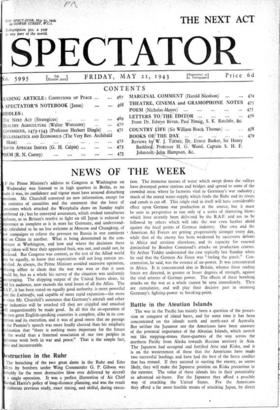estruction in the Ruhr
The breaching of the two great dams in the Ruhr and Eder 11;vs by bombers under Wing Commander G. P. Gibson was ahably far the most destructive blow ever delivered by aircraft a single operation. It was a perfect .illustration of Air Chief arshal Harris's policy of long-distance planning, and was the result elaborate previous study, exact timing, and skilful, daring execu- tion. The immense masses of water which swept down the valleys have destroyed power stations and bridges and spread to some of the crowded areas where lie factories vital to Germany's war industry ; much of the stored water-supply which feeds the Ruhr and its rivers and canals is cut off. This single raid in itself will have considerable effect upon German war production at the source, but it must be seen in perspective as one only of a series of shattering blow; which have recently been delivered by the R.A.F. and are to be followed by others which will take the war even further afield against the focal points of German industry. Our own and the
• American Air Forces are getting progressively stronger every day, while that of the enemy has been weakened by successive defeats in Africa and attrition elsewhere, and its capacity for renewal diminished by Bomber Command's attacks on production centres. Sir Arthur Tedder understated the case typically last Sunday when he said that the German Air Force was " feeling the pinch." Con- centration, he said, was the essence of air-power. It was concentrated in Africa. It is concentrated also in Britain, whence these raiding forces are directed, in greater or lesser degrees of strength, against the vital arteries of German power. The effects of these bombing attacks on the war as a whole cannot be seen immediately. They are cumulative, and will play their decisive part in straining Germany's fighting-power to breaking-point.


























